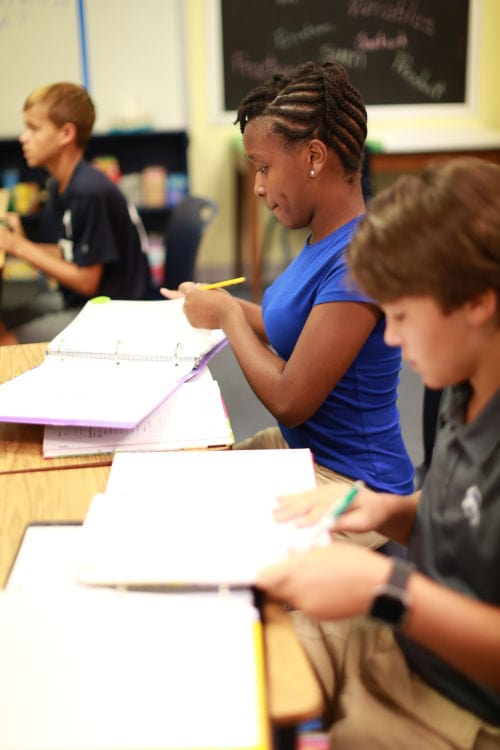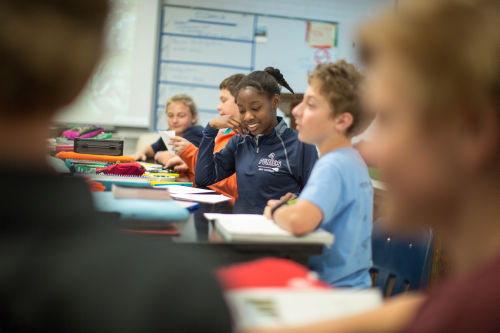Surprising Strategies to Help Your Child Learn
By Guest Blogger Priscilla St. John, Director of Publications & Special Projects at FCDS
You send your kids to a good school, you check their homework, you may even help them study for tests. But are you really helping them learn? Dr. Michelle Klosterman, a veteran teacher and Associate Head of School for Academic Affairs at Forsyth Country Day School, debunks some popular myths and shares learning strategies that may surprise you.
Myth: You should have a dedicated study space and routine.
 Fact: Actually, the opposite is true. “The more environments in which you rehearse, the sharper and more lasting the memory of that material becomes,” Dr. Klosterman says. “Most people learn better by studying in different locations, using different methods, at different times of the day, constantly changing the way they store material in memory.”
Fact: Actually, the opposite is true. “The more environments in which you rehearse, the sharper and more lasting the memory of that material becomes,” Dr. Klosterman says. “Most people learn better by studying in different locations, using different methods, at different times of the day, constantly changing the way they store material in memory.”
Myth: As long as you memorize the notes you took in class and carefully highlighted, you’ll ace the test.
Fact: “Reading highlighted material is one of the least effective ways to study; the same goes for verbatim copying,” Dr. Klosterman reveals. “Both are fairly passive and don’t engage the brain in the kind of work that will make learning sink in.” In fact, this kind of passive review can cause what cognitive scientists call the “fluency illusion” – unwarranted confidence that you’ll remember it for good.
Myth: You should never cram for a test.
Fact: It certainly shouldn’t be your go-to strategy, but: “It’s okay if you’re behind and have no choice,” Dr. Klosterman says. “The downside is that you won’t remember much after the test or performance. That’s because the brain sharpens memories only after a little forgetting has taken place.”
Myth: Keep smartphones far away and never check social media while studying.
Fact: It’s actually O.K. to take study breaks and text a friend, scroll through Instagram, or Snapchat. “Unless you’re trying to give continuous focus to a lecture or another sequential, connected learning experience, taking short study breaks is the most effective technique learning scientists know of,” Dr. Klosterman reports. “Distracting yourself from the task at hand allows you to let go of mistaken assumptions, reexamine the clues in a new way, and come back fresh.”
 So, what are the best strategies to learn and retain information?
So, what are the best strategies to learn and retain information?
Test Yourself
“Self-testing is one of the strongest study techniques there is,” Dr. Klosterman says. This includes using flashcards, getting quizzed by a friend (or parent), reciting something from memory, or attempting to teach it to a friend. “Testing yourself or being tested does two things: it forces you to retrieve information from memory, and it gives you immediate feedback if you couldn’t remember it so you know what you don’t know and need to work on some more.”
Mix it Up
If you work on just one thing, like playing musical scales or the quadratic equation, skill improves. “Over time, though, such focused practice actually limits our development of that skill,” Dr. Klosterman reports. So, mix it up: review multiple skills during a single study session. “Mixed practice helps review material from several areas, sharpens differentiating among them, and trains the brain to match the problem types with appropriate strategies.”
Sleep the Right Way
Need to ace a history test filled with names and dates? Go to bed at your usual bedtime. “The deep sleep that occurs in the first half of the night is most important for consolidating and retaining hard facts – names, dates, formulas, concepts,” Dr. Klosterman says. If you need to excel at something creative, however – in math, science, writing, or music, staying up later and sleeping in can be helpful. “The kind of sleep we have in the early morning hours helps consolidate motor skills and creative thinking.”
 Break it Up
Break it Up
No matter how much study time you have – a month, a week, or a day – break what you’re trying to learn into pieces. For general study, break studying sessions into chunks over several days. “Each time, you reengage with the material, retrieve it, and restore it,” Dr. Klosterman reveals. “It’s an active mental step that reliably improves memory.”
For a complicated long-term project such as a term paper, the process is similar. “Get started as early as possible, split the work into chunks, and spread it out over time,” Dr. Klosterman says. “It activates the project in your mind and you’ll begin to see and hear all sorts of things in your daily life that are relevant. You’ll also be more tuned into what you think about those random, incoming clues.”
So, were you surprised by some of these myths and learning strategies? At Forsyth Country Day, we’re always thinking about ways to prepare students for what’s ahead. Do you want to explore what’s ahead for your child’s education? Schedule a tour today at fcds.org today.
Source: How We Learn by Benedict Carey
*Sponsored by Forsyth Country Day School
